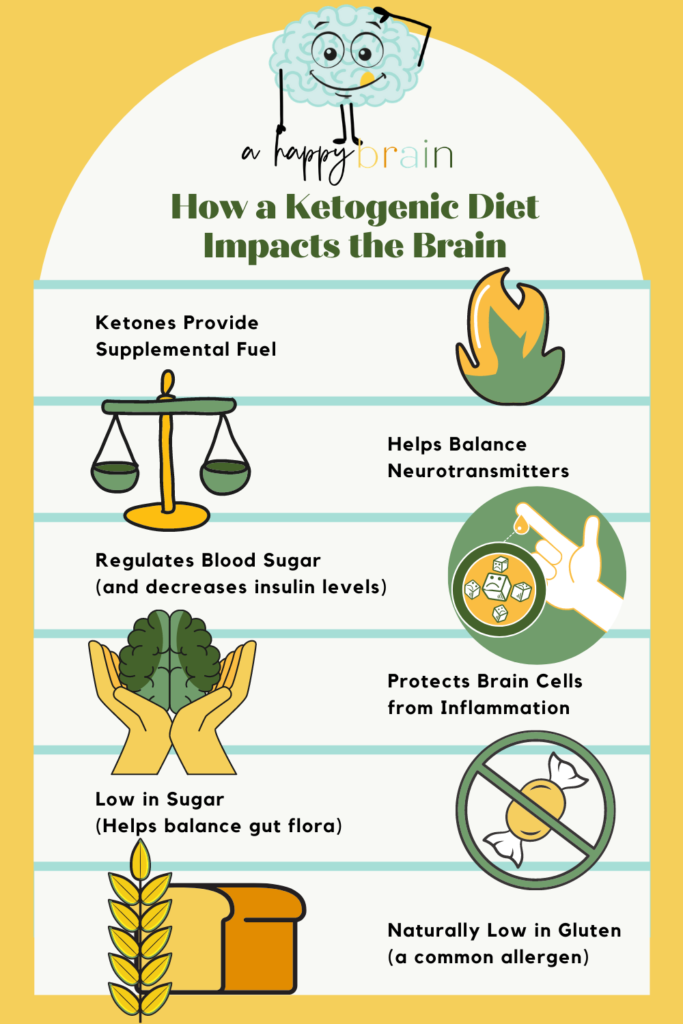The ketogenic diet has exploded in popularity for weight loss, but what about ketosis and brain function? Can this way of eating change how our brain works? Read on to find out!
Welcome readers, and thanks for dropping by! In this article, I’m going to look at the science around the link between ketosis and brain function. But firstly, for those of you who haven’t heard of the incredibly trendy ketogenic diet (or have heard of it but have no clue what it is!) let me give you a quick rundown of the whole idea.
In my other articles on food and the brain, I’ve mentioned proteins and fats. I’ve discussed how important these nutrients are to the health of our brains. I also did a whole piece on sugars and carbs, and how sugar and simple carbs are best kept to a minimum. Well, the ketogenic diet is all about loading up the fats, eating adequate protein, and cutting down the carbs. This change in macronutrients pushes the body to burn fat as fuel–making ketones. Some call this a state of “ketosis”.
While some may consider a ketogenic diet extreme, this adjustment of macronutrients has some interesting impact on the brain. In fact, this diet was originally developed to help alleviate epileptic seizures.
As we learned in the post on sugar, the brain uses glucose as its main source of fuel. In addition to this, we learned that controlling glucose levels in the blood helps optimize brain health. We found that high blood sugar does not mean that your brain gets more fuel. In fact, the opposite may be true.
While the brain may use glucose, it can also take advantage of an alternative source of fuel–ketones. This is where the ketogenic diet comes in. This diet takes advantage of our natural ability to survive in times when food is scarce. When carbohydrate intake is very low, the body starts converting fat into fatty acids and “ketones”. These ketones become fuel for the brain, as well as other cells in the body.
An Alternative Fuel Source
There is mounting evidence that using having ketones available for fuel can benefit the brain. One reason they can be helpful is that ketones are able to pass into the brain more easily than glucose. Those who suffer from neurodegenerative conditions have trouble getting glucose into their brain cells1. Meanwhile, ketones can easily pass into the brain and provide much-needed supplemental fuel.
While the ketogenic diet may help certain brain diseases, it may also provide general brain benefits2. This piqued the interests of those in the mainstream nutrition field. Over the past few years, millions worldwide have adopted this way of eating.

Defining ‘Keto’
At this point, I think it’s important to define what we mean when we talk about a ketogenic diet. The actual medical term means “to make ketones”. The original diet, developed in the 1920’s to treat people with epilepsy, was an extremely strict, super high-fat regime. This version involved eating large amounts of heavy whipping cream and butter with each meal.
In the last few decades, however, versions of this diet have popped up, the most famous being the Atkins Diet. The Atkins diet restricts carbohydrates with the main aim of helping people lose weight. Other versions include the “modified Mediterranean-ketogenic diet”, which is a much more palatable version. This variation swaps cream for olive oil, and even allows a glass or two of wine (cheers!).
So, for the purposes of this article, when I speak about a ketogenic diet, I’m referring to a diet that creates a fat-burning state and generates ketones.
Now that we’ve cleared that up, let’s look at some of the research linking the ketogenic diet and the health of your brain.

Ketosis and Brain Function- Alzheimer’s Disease
The ketogenic diet has been studied as a treatment for Alzheimer’s for decades, and the results are positive. The question is, how does your diet affect your brain health so much?
One theory is linked to the ‘gut-brain axis’. Scientists describe this as the “bidirectional communication between the central and the enteric nervous system, linking emotional and cognitive centers of the brain with peripheral intestinal functions”3. Let’s just say that it’s how the brain and the gut talk to each other.
Recent research has shown a strong link between the health of your gut and that of your brain. To add to the growing evidence in this field, researchers have found associations between the effects of a modified Mediterranean -ketogenic diet on the micro-fungi living in the gut and the occurrence of Alzheimer’s disease4.
Scientists are also looking at using versions of a ketogenic diet to prevent and treat Alzheimer’s. Studies have shown5 that a low-carb diet reduces the amount of amyloid plaques6. Amyloid plaques play a role in Alzheimer’s disease as well some other neurodegenerative diseases. This leads me onto the next interesting link between carbs and the mind.
Ketosis and Brain Function- Parkinson’s Disease
The ketogenic diet is proving to be beneficial to the function of the brain in general. In fact, there are many hypotheses as to the root of its neuroprotective properties7. When it comes to Parkinson’s disease, one study8 compared a ketogenic diet to a low-fat diet. Researchers found that those on the ketogenic diet had a greater reduction than those on the low-fat diet in the non-motor symptoms such as fatigue and cognitive impairment.
Of course, more research needs to be done on this topic. However, versions of the keto diet are currently being used as supplemental therapies for Parkinson’s disease, with positive results.
Ketosis and Brain Function – Age-Related Cognitive Decline
“Age-related cognitive decline”, dementia, and memory loss, are common problems in the elderly. A ketogenic diet may prove helpful to the aging population
For example, studies show that a ketogenic diet has a positive effect on memory performance9 in older people. Also, researchers have found that ketones have protective qualities for our brain in the long run10. This protective effect may have the potential to lower the incidence of dementia as we age.
The Ketogenic Diet and Mental Health
Ketogenic and low-carb diets can put you in a great mood, and not only because of all the butter and bacon you get to eat! Diet and mental health are inextricably linked. Because of this, many researchers have focused on how the foods we eat affect our mood. They have also studied how diet impacts our susceptibility to conditions like anxiety and depression.
Scientists hypothesize that ketogenic diet may help balance neurotransmitters, the signaling chemicals in the brain.11 They suspect that this way of eating decreases excitatory glutamate and increases Gamma Aminobutyric Acid (GABA). Rebalancing these neurotransmitters may be one way that ketosis helps decrease the number and severity of seizures in those with epilepsy. In addition, many neurodegenerative diseases are associated with excess glutamate and decreased amounts of GABA.
The increased levels of GABA from a ketogenic diet might be helpful to those with conditions associated with lower levels of this neurotransmitter. These conditions include mood disorders (such as depression, and anxiety), insomnia, high blood pressure, and even type 2 diabetes.
In addition to addressing the brain at the chemical level, a ketogenic diet might also provide relief at the gut level. The reduction in sugars may help gut health and insulin function. Both of which are closely linked with depression. However, there is some debate about whether aspects of the ketogenic diet can exacerbate some mental health issues. As always, it is best consult your physician before embarking on a very low carb campaign.
I also want to point out that you should not cut fiber out of your diet when eating a ketogenic diet. While fiber is considered a carb, it does not impact blood sugar like other types of carbohydrates. Fiber does, however, play an important role in the health of the microbiome of the gut. Soon, I’ll share an entire article on why this microbiome is so important to the nervous system.

The Rundown on Ketosis and Brain Function
As we can see, a large body of evidence links the ketogenic diet and the state of our gray matter. One major benefit of “going keto” is the significant reduction in carb/sugar intake. This controls blood sugar and lowers the level of insulin in the blood stream. This decrease in sugar can also address gut health.
Another benefit of the diet is that ketones are an effective source of fuel for brains. This fuel provides a life line to brain cells that can no longer properly absorb glucose. It also helps those cells that can no longer process glucose efficiently. Overall, this seemingly trendy diet has definite benefits for the health of your brain, especially as you age.
If you think a ketogenic diet is too restrictive, you might want to check out our sister blog, simplysohealthy.com. This is where I share loads of low-carb recipes that can be part of a ketogenic diet. I think you’ll find that restricting carbs can be tasty!
A ketogenic diet is also naturally very low in gluten. There are some very interesting links between consuming gluten and the overall health of your brain. So interesting, in fact, that I’ve devoted a whole article to it. See you there!
Dr. Annissa Slusher
References:
- https://www.sciencedirect.com/science/article/pii/S0074774220300465
- https://journals.lww.com/co-clinicalnutrition/Abstract/2008/03000/The_ketogenic_diet_and_epilepsy.6.aspx
- https://www.ncbi.nlm.nih.gov/pmc/articles/PMC4367209/
- https://www.sciencedirect.com/science/article/pii/S2352396419305547
- https://www.sciencedirect.com/science/article/abs/pii/S0899900718302764#
- https://www.news-medical.net/health/What-are-Amyloid-Plaques.aspx#:~:text=Amyloid%20plaques%20are%20aggregates%20of,memory%20and%20other%20cognitive%20functions.
- https://www.frontiersin.org/articles/10.3389/fphar.2012.00059/full
- https://movementdisorders.onlinelibrary.wiley.com/doi/pdf/10.1002/mds.27390
- https://pubmed.ncbi.nlm.nih.gov/21130529/
- https://pubmed.ncbi.nlm.nih.gov/32127481/
- https://www.ncbi.nlm.nih.gov/pmc/articles/PMC2722878/


Is there a list of things we should eat if we want to do the keto eating?
Hi Monica,
The basic idea of a keto diet is to cut down on the carbs so that the body burns fat. I could write an entire book to answer your question. A good place to start is just by searching “how to start a keto diet”.
Best,
Dr. Slusher